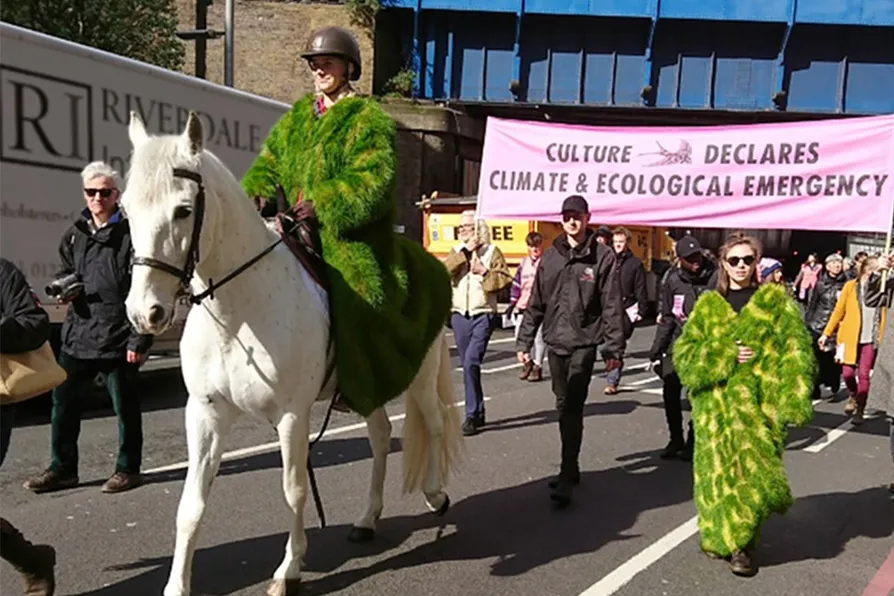WILL STONE is frustrated by a performance that chooses to garble the lyrics and drown the songs in reverb
Error message
An error occurred while searching, try again later.ANDY HEDGECOCK, MARIA DUARTE and ANGUS REID review Ackroyd & Harvey: The Art of Activism, The Lost Bus, A Big Bold Beautiful Journey, and Happyend

 GOOD GRASS: Ackroyd & Harvey: The Art of Activism [Pic: IMDb]
GOOD GRASS: Ackroyd & Harvey: The Art of Activism [Pic: IMDb]
Ackroyd & Harvey: The Art of Activism (12A)
Directed by Fiona Cunningham-Reid
★★★★
“THE bigger issues, of course, are around who controls media, who controls power,” says Heather Ackroyd in a frank reflection on the impact of her art and activism.
Fiona Cunningham-Reid’s truthful and multilayered documentary celebrates Ackroyd’s 35-year artistic collaboration with Dan Harvey and chronicles the collapse of their personal relationship.
It also explores the revolutionary potential of visual art. Footage of the artists’ attention-grabbing work with Extinction Rebellion is accompanied by commentary from fellow climate campaigners. Harvey discusses the difficulty of balancing integrity against financial security and reveals he and Ackroyd have declined work from BMW and Monsanto.
We see the detailed planning, complex processes and hard work of bringing visionary ideas to fruition. Some of the artworks are ephemeral and few will outlive their creators. There’s a crystal encrusted whale skeleton; a model in a grass coat, riding a white horse in Tate Modern’s Turbine Room; and living grass portraits of environmental activists – photography meets photosynthesis.
The connection between these disparate elements is enhanced by Richard Durrant’s fine guitar- and cello-based score and Catherine Arend’s deft editing. The opening sequence is a fascinating montage of Ackroyd & Harvey’s fusions of activism, biology and ecology. It begins with an apparent aerial view of a furrowed field which — after cutting from close-up to long shot — turns out to be a pair of trompe l’oeil curtains, gigantic and fashioned in grass.
Enlightening and imaginative, the film highlights the graft, craft, context and wonder of Ackroyd & Harvey’s work. Highly recommended.
AH
In cinemas September 19.
The Lost Bus (15)
Directed by Paul Greengrass
★★★
THIS intense and hair-raising drama recounts how a school-bus driver and a dedicated schoolteacher battled to save 22 children in 2018 from one of the deadliest fires in California’s history.
Co-written and directed by Paul Greengrass and inspired by true events, it is based on Paradise: One Town’s Struggle to Survive an American Wildfire by Lizzie Johnson. It is an action-packed thriller which puts you front and centre in the fire’s path. It is exceedingly claustrophobic and you can almost smell and feel the heat of this terrifying inferno which, even though it is mostly CGI, is difficult to tell from the real thing.
Shot like a docudrama, Matthew McConaughey and America Ferrera are outstanding as the wayward bus driver and teacher who were so heroic on that day rescuing kids from a fire that killed 85 people.
MD
In select cinemas September 19/on Apple TV+ from October 3.
A Big Bold Beautiful Journey (15)
Directed by Kogonada
★★★
THIS is certainly bold, it looks beautiful and it takes you on one hell of a surreal journey, but what it is trying to say about finding love — particularly in later life — isn’t that clear.
Directed by Kogonada (Columbus) and written by Seth Reiss (The Menu) it follows two strangers, David (Colin Farrell) and Sarah (Margot Robbie), who meet at a mutual friend’s wedding and are then taken by their old rental car’s weird and intuitive GPS (Jodie Turner-Smith) to revisit key moments in their past via magical doors.
Each one makes them confront their demons and gives them a deeper understanding of the person they have become.
It is Farrell and Robbie’s undeniable on-screen chemistry and charisma that keeps you invested in these flawed and troubled characters who continually challenge each other.
While Kogonada makes imaginative and creative stylistic choices they don’t all work and there isn’t an earth-shattering reveal so you may feel cheated by the end.
MD
In cinemas September 19.
Happyend (12A)
Directed by Neo Sora
★★
THIS film ought to have so much going for it. Set in a near-future Japan becoming increasingly ethno-nationalist and authoritarian, it examines how these negative pressures impact on a school and an ethnically diverse group of sixth-formers. In the periphery of their normal lives police beat up protesters, use facial recognition to access identity papers, and the threat of earthquakes continuously “fakes an emergency to establish a dictatorship,” as one of the kids puts it.
When the headteacher, infuriated by pranks and surliness, installs a digital panopticon to enforce discipline, a small group rebel and lock themselves in his office in a principled act of protest.
This basic premiss is excellent, but the film fails to convince: it feels stagey, and the acting is strangely wooden, as though the characters are going through the motions and being forced to enact scenes they dont believe in and cannot embody.
As a school drama-class exercise it’s not bad, but as a movie it doesn’t cut the mustard. It might aspire to be a futurist version of “If”, but in its undeveloped and superficial execution it is indigestible as yesterday’s Pot Noodle.
AR
In cinemas September 19.










